
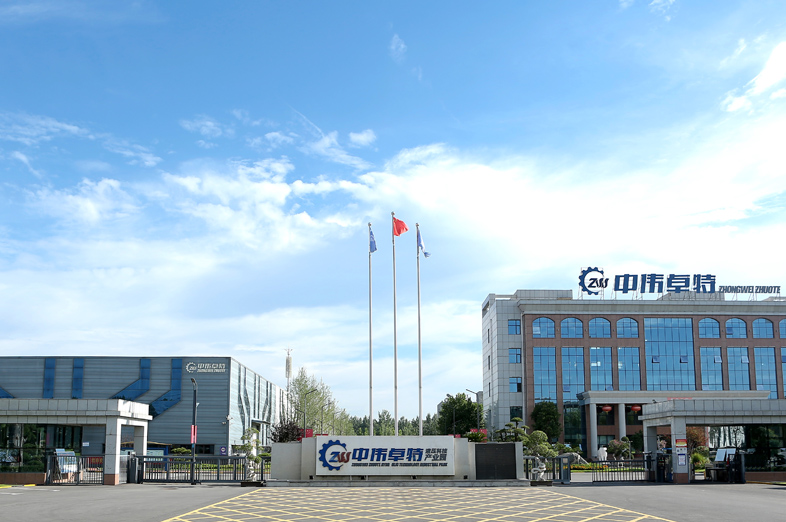
A Leap Towards Safer Construction Sites
As construction sites become more complex and regulations tighten, the focus on enhancing safety standards for excavators has never been more critical. Intending to reduce accidents and ensure worker safety, industry leaders are taking significant strides in implementing advanced safety measures. One notable player in this movement is Liusan Global Excavator, a key manufacturer of excavators and spare parts such as hydraulic pumps, travel motors, Slewing rings, slewing motors, hydraulic hammer breakers, etc. We are known for our commitment to both innovation and safety.
Raising the Bar for Excavator Safety
Excavators, essential for a wide range of construction tasks, present unique safety challenges. Recent advancements aim to address these challenges through the integration of cutting-edge technology and improved design features. Enhanced safety standards are not just a response to regulatory pressures but a proactive approach to safeguarding workers and preventing accidents.
Innovative Safety Features
Advanced Sensor Systems: Modern excavators are increasingly incorporating sensors and cameras to provide real-time monitoring of the machine’s surroundings. These systems can detect obstacles, alert operators to potential hazards, and even automate safety protocols in critical situations.
Improved Visibility: Enhanced cab designs and panoramic windows improve operator visibility, reducing blind spots and making it easier to monitor the machine’s surroundings.
Automatic Safety Controls: Innovations such as automatic stabilization systems and real-time load monitoring ensure that the excavator operates within safe parameters, minimizing the risk of tip-overs and mechanical failures.
Liusan Global’s Commitment to Safety
Liusan Global, a prominent manufacturer of hydraulic hammer breakers, is at the forefront of integrating safety enhancements into its equipment. Recognizing the critical role that safety plays in construction, the company has been actively developing and incorporating advanced safety features into its product line.
‘Our focus has always been on improving the reliability and efficiency of our hydraulic hammer breakers’. But safety remains a top priority. We are continuously working to integrate features that not only enhance performance but also ensure the highest safety standards for operators.
Collaboration and Industry Standards
Liusan Global is also collaborating with industry organizations and regulatory bodies to help shape the future of safety standards for excavators. By participating in working groups and contributing to safety guidelines, the company is playing a key role in driving industry-wide improvements.
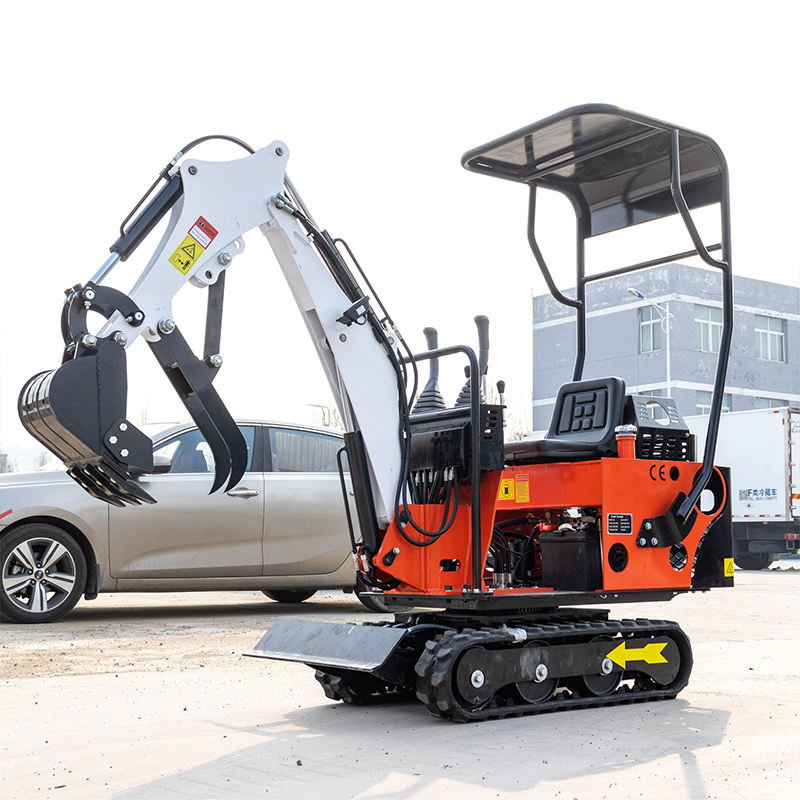
Mini excavators have become indispensable tools in various industries, including construction, landscaping, and agriculture. Despite their small size, these compact machines pack a punch, thanks to several technological advancements. Here's a look at the key innovations that have transformed mini excavators into powerful, versatile, and efficient tools.
Advanced Hydraulic Systems
One of the most significant advancements in mini excavators is the development of sophisticated hydraulic systems. Modern hydraulic systems provide:
Precision Control: Enhanced hydraulic controls allow operators to perform delicate and precise movements, which is crucial in confined spaces and intricate tasks.
Improved Efficiency: Variable flow hydraulic systems adjust the power output based on the task at hand, reducing fuel consumption and increasing overall efficiency.
Increased Power: High-pressure hydraulic systems deliver more digging power and faster cycle times, improving productivity.
Compact and Powerful Engines
The heart of any mini excavator is its engine. Recent advancements in engine technology have led to:
Higher Power Density: Newer engines provide more power without increasing the size or weight of the machine.
Fuel Efficiency: Modern engines are designed to be more fuel-efficient, reducing operating costs and environmental impact.
Emissions Compliance: Engines now comply with stringent emissions regulations, making them more environmentally friendly.
Advanced Control Systems and Automation
Technology has significantly improved the control systems of mini excavators:
Joystick Controls: Ergonomic joystick controls provide intuitive and precise operation, reducing operator fatigue.
Telematics: Advanced telematics systems allow for real-time monitoring of machine performance, location, and diagnostics, helping to optimize maintenance schedules and minimize downtime.
Semi-Automation and Machine Control: Features like automatic grading, depth control, and swing boom assist enhance accuracy and reduce the skill level required for complex tasks.
Enhanced Attachments and Versatility
Mini excavators are more versatile than ever, thanks to a wide range of attachments:
Quick Couplers: These allow operators to switch between attachments quickly and easily, maximizing machine utilization.
Diverse Attachments: From buckets and augers to hydraulic hammers and grapples, the variety of attachments available makes mini excavators suitable for a wide range of applications.
Smart Attachments: Some modern attachments come with integrated sensors and control systems, allowing for more precise and automated operation.
Improved Safety Features
Safety is a paramount concern in the operation of heavy machinery. Recent advancements include:
Enhanced Visibility: Cameras and improved cab design provide better visibility, reducing blind spots and the risk of accidents.
Operator Protection: Features like ROPS (Roll-Over Protective Structures) and FOPS (Falling Object Protective Structures) protect operators in case of accidents.
Stability Control: Advanced stability control systems prevent tipping and ensure safe operation on uneven terrain.
Electric and Hybrid Models
The push for greener technology has led to the development of electric and hybrid mini excavators:
Reduced Emissions: Electric and hybrid models produce zero or significantly lower emissions, making them ideal for urban areas and indoor use.
Lower Noise Levels: These models operate more quietly, reducing noise pollution and improving working conditions in noise-sensitive environments.
Energy Efficiency: Electric models are highly energy-efficient, reducing operating costs over the machine’s lifetime.
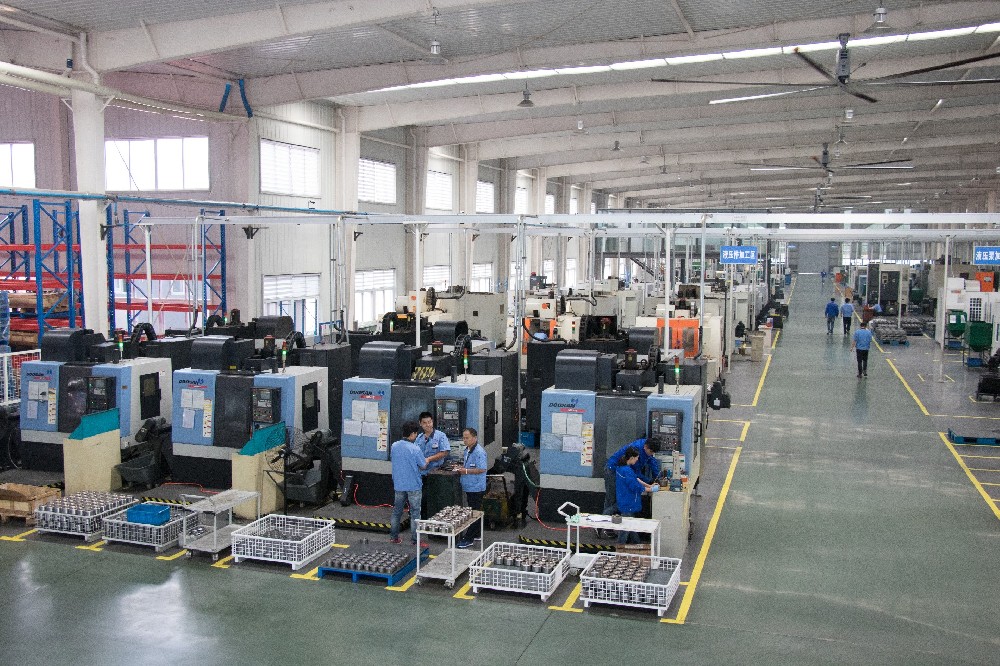
The construction industry is on the brink of a significant transformation with the introduction of cutting-edge electric excavator technology. This innovation promises not only to enhance efficiency on construction sites but also to significantly reduce the environmental footprint of heavy machinery operations.
The Rise of Electric Excavators
Electric excavators are poised to become the new standard in construction, offering a range of benefits over their traditional diesel counterparts. With zero emissions, these machines address the urgent need to reduce greenhouse gas emissions in industrial activities. As global regulations tighten and the construction industry seeks greener solutions, electric excavators emerge as a vital part of this transition.
Technological Advancements
The latest models feature advanced battery technology, enabling longer operational hours and faster charging times. These improvements alleviate one of the main concerns regarding electric heavy machinery: downtime. High-capacity lithium-ion batteries, coupled with regenerative braking systems, ensure that these excavators can operate efficiently throughout the day.
Innovative motor designs also contribute to enhanced performance. The electric motors offer instant torque, resulting in smoother and more precise movements. This precision is crucial for tasks that require meticulous handling, such as digging around existing infrastructure or in confined urban environments.
Economic and Environmental Benefits
While the initial investment in electric excavators may be higher, the long-term savings are substantial. Reduced fuel costs and lower maintenance requirements—thanks to fewer moving parts and no need for oil changes—translate to significant cost reductions over the machine's lifespan. Furthermore, electric excavators operate more quietly, minimizing noise pollution and making them ideal for use in noise-sensitive areas.
From an environmental perspective, the shift to electric excavators is a major step forward. By eliminating diesel exhaust emissions, these machines contribute to cleaner air quality on construction sites and surrounding areas. This change not only benefits the environment but also improves the health and safety conditions for construction workers.
Industry Adoption and Future Outlook
Leading construction equipment manufacturers are already embracing this technology. Pilot projects in Europe and North America have demonstrated the practical viability of electric excavators in real-world conditions.
As infrastructure projects continue to expand globally, the demand for sustainable construction solutions will only grow. Electric excavators represent a pivotal development in this trend, paving the way for a cleaner and more efficient construction industry.
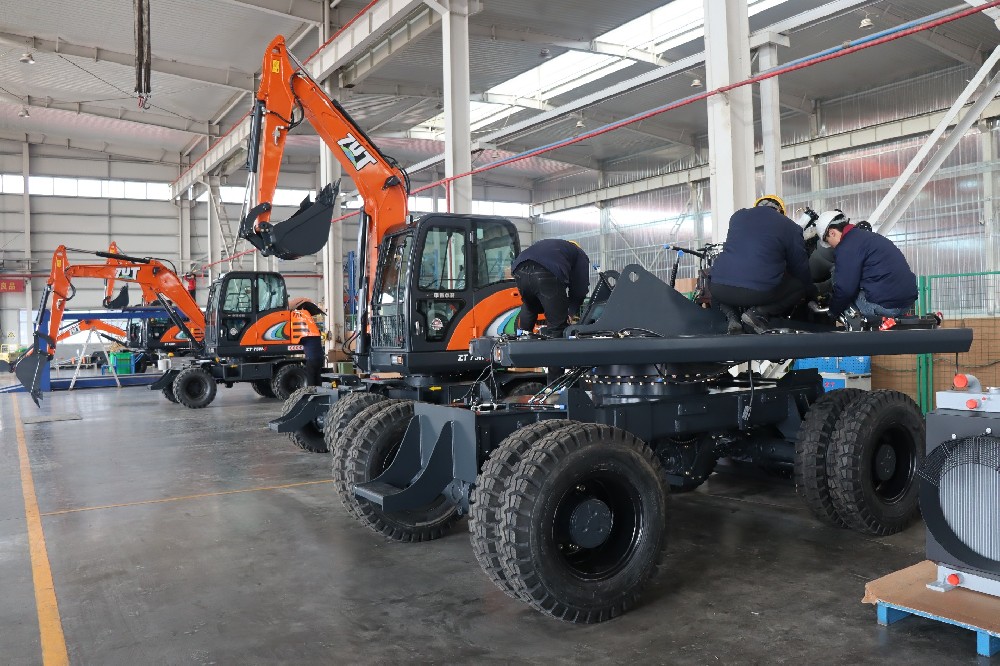
Did you know that the concept of the excavator dates back to the 19th century? The first mechanized excavator, known as the "steam shovel," was invented by William Otis in 1835. This early machine was powered by steam and used a single bucket to scoop up earth, revolutionizing the way excavation work was done. Otis's invention laid the groundwork for the modern excavators we see today.
we not only focus on the future of construction machinery but also appreciate its rich history. Excavators, a cornerstone of modern construction, have undergone remarkable transformations over the years. In this news update, we delve into the fascinating history of excavators, exploring some interesting facts that highlight their evolution and the innovative spirit behind their development.
Hydraulic Revolution
The introduction of hydraulic technology in the mid-20th century marked a significant milestone in the evolution of excavators. Hydraulics allowed for more precise and powerful movements, making excavators more efficient and versatile. This breakthrough enabled the development of various attachments and enhanced the machine's ability to perform a wide range of tasks, from digging trenches to demolishing structures.
Technological Advancements
The 21st century has brought unprecedented technological advancements to the excavator industry. Modern excavators are now equipped with GPS, telematics, and advanced control systems, allowing for remote operation and real-time monitoring. These innovations have significantly improved efficiency, safety, and precision on construction sites. At Liusan Global Excavator, we are proud to integrate these cutting-edge technologies into our latest models.
Interesting Fact
Excavators are not just limited to construction sites. They have been used in some truly unusual and challenging environments. For instance, specialized excavators have been employed in underwater excavation projects, such as dredging riverbeds and harbors. These amphibious excavators are designed to operate in water and on land, showcasing the incredible adaptability of this machinery.
The Future of Excavators
As we look to the future, the excavator industry continues to evolve with a focus on sustainability and automation. Electric and hybrid excavators are becoming more prevalent, reducing the environmental impact of construction activities. Autonomous excavators, equipped with AI and machine learning, are set to revolutionize the industry by performing complex tasks with minimal human intervention.
For more interesting facts and updates about excavators, visit our website or contact us directly. Join us as we continue to uncover the history and drive the future of construction machinery.
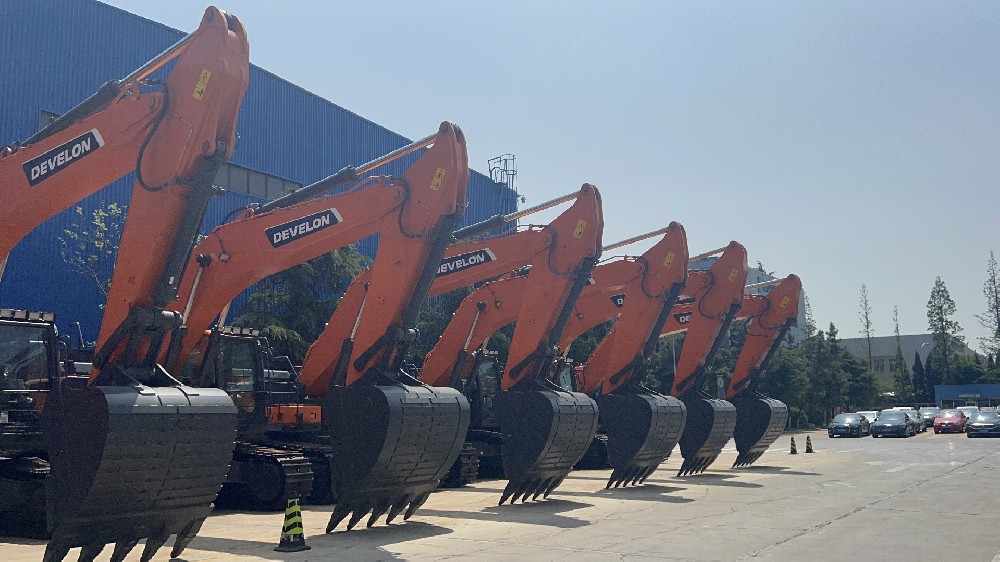
Doosan, a global leader in heavy construction equipment, has unveiled its latest innovation - the DX550LC-7 excavator.
This colossal machine is set to revolutionize the way large-scale earthmoving and demolition projects are tackled, delivering unprecedented power, precision, and efficiency.
At the heart of the DX550LC-7 is a newly developed, fuel-efficient engine that produces an astounding 512 horsepower. Combined with Doosan's advanced hydraulic system, this excavator can generate an industry-leading breakout force of over 80 metric tons - a true testament to its raw capabilities.
"The DX550LC-7 represents the pinnacle of our engineering prowess," Doosan's Vice President of Product Development.
This machine is designed to take on the most demanding jobsite challenges with unparalleled performance, while also prioritizing operator comfort, safety, and environmental sustainability.
Indeed, the DX550LC-7 comes packed with innovative features that elevate the operator experience.
A spacious, ergonomically designed cabin provides excellent visibility and intuitive controls, reducing fatigue even during the longest shifts.
Advanced telematics and predictive maintenance systems further optimize productivity and uptime.
Doosan has also made significant strides in improving the excavator's environmental footprint. Reduced fuel consumption, lower emissions, and an eco-friendly hydraulic system make the DX550LC-7 one of the greenest machines in its class.
"As the construction industry continues to evolve, Doosan is committed to leading the charge with groundbreaking equipment that raises the bar for power, efficiency, and sustainability. "The DX550LC-7 is a testament to that unwavering dedication."
Slated for delivery in March, the Doosan DX550LC-7 is poised to become the centerpiece of large-scale infrastructure, mining, and demolition projects around the world. With its unparalleled capabilities and forward-thinking design, this excavator is set to redefine what's possible on the modern jobsite.

The excavator manufacturing industry plays a crucial role in the construction and mining sectors. These versatile machines have become an integral part of various projects worldwide. When it comes to choosing an excavator manufacturer, the availability of a huge collection of spare parts and a long history of industry experience are important factors to consider. And we are offering a huge range of quality spare parts all over the world.
Experience in the Excavator Industry
One of the key factors that sets an excavator manufacturer apart from its competitors is the availability of a huge collection of spare parts. Inevitably, excavators, like any other machinery, may encounter malfunctions or require parts replacement over time. Therefore, a manufacturer like us offering an extensive range of spare parts is essential. Experience is a crucial asset when it comes to the manufacturing of excavators. A manufacturer with an established history in the industry has likely refined its production processes and knows what it takes to deliver high-quality, reliable machines. With expertise accumulated over time, such manufacturers are better equipped to address the specific needs and challenges of different construction and mining projects.
With a dedicated team focused on R&D, excavator manufacturers can explore new technologies, materials, and designs to enhance the overall quality and efficiency of their machines. By staying up-to-date with the latest advancements in the industry, manufacturers can produce excavators that meet the ever-evolving demands of the market.
A global presence also helps ensure that spare parts are readily available regardless of the location of the customer, further enhancing the customer experience and minimizing downtime.